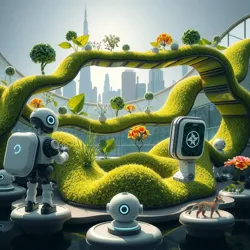Symbiobotanic Gardens

Symbiobotanic Gardens represent a revolutionary approach to public green spaces, where advanced robotics and natural ecosystems coexist in a harmonious environment. These gardens are designed to educate visitors about symbiotic relationships and promote sustainable living practices in a post-scarcity society.
Concept and Design
The concept of Symbiobotanic Gardens emerged from the collaboration between botanists and engineers at the Robotic Gardeners of Eden. These gardens are engineered to function as self-sustaining ecosystems, utilizing plant-based robotics to maintain and enhance the health of the flora. The robotic caretakers are equipped with sensors and AI algorithms that enable them to monitor plant health, optimize resource use, and even communicate with each other to balance the ecosystem's needs.
Key Features
- Robotic Caretakers: The gardens employ a range of robotic systems that perform various functions such as watering, pruning, and pest control. These machines are powered by innovative photosynthetic energy systems, ensuring minimal environmental impact.
- Interactive Learning Spaces: Visitors can engage with interactive displays that demonstrate the principles of symbiosis and sustainable technology. These spaces are designed to inspire curiosity and educate the public about the potential of technology to support ecological balance.
- Biodiversity Hubs: Each garden acts as a biodiversity hub, hosting a variety of plant species that attract local wildlife, including pollinators and small mammals, thereby promoting ecological diversity.
Benefits and Impact
Symbiobotanic Gardens offer numerous benefits to both urban and rural communities. They provide green spaces that improve air quality, support mental well-being, and encourage community engagement with nature. By integrating technology with natural systems, these gardens also serve as platforms for research and innovation, advancing knowledge in fields such as automated ecology and renewable energy.
Educational Initiatives
Education is a cornerstone of the Symbiobotanic Gardens. Programs such as workshops, guided tours, and school visits are regularly organized to raise awareness about environmental issues and the role of technology in addressing them. Partnerships with educational institutions help to ensure that the gardens remain at the forefront of ecological and technological education.
Future Developments
The future of Symbiobotanic Gardens is promising, with plans to expand their reach and influence. New projects aim to incorporate Symbiotic Sound Waves into the gardens, creating an immersive audio-visual experience that mimics the natural symphonies of the environment. These developments promise to further bridge the gap between technology and nature, offering new ways to experience and understand the world around us.
See Also
- Robotic Gardeners of Eden
- Institute of Photosynthetic Machines
- Festival of Resonant Automation
- Cosmic Harmony Initiative
References
- "Innovations in Symbiotic Ecosystems," Journal of Sustainable Living, 2057.
- "The Role of Robotics in Modern Gardens," Proceedings of the Eco-Tech Symposium, 2058.
- "Educational Impact of Symbiobotanic Gardens," Journal of Environmental Education, 2059.